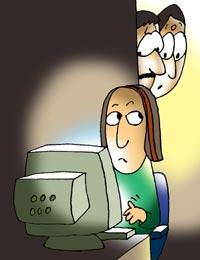Ajay Jain
Big Brother is watching you. On Facebook, Orkut, LinkedIn and Twitter. And other social networking sites that you create a profile on. Are you sure the contents will not cause any personal or professional damage to you?
Here are some tips to keep in mind when you disclose a good part of your day-to-day life online for the world to see.
Photographs
What kind of photographs of yours have been put up? Are they suggestive or revealing in any way? Yes, they may be fine by your standards but we live in a world where there is no dearth of 'sickos'. Even if you want to share such photos with friends and family online, host them on password-protected, secure sites. Likewise, avoid posting high-resolution pictures that can be downloaded, manipulated and misused. If your friends have posted pictures that may lead to trouble, request them to pull them off. You don't want your beach holiday pictures to turn into a nightmare, do you?
Your contact info
Think before you post your telephone numbers and address on your profile. You don't want to be inviting trouble home, nor do you want to be barraged by incessant, unwelcome phonecalls.
Ajay Jain is an author and blogger. He writes on social media and blogs for marketing and PR on www.socialambit.com
Discretion is the name of the game
Remain discreet about your movements
If you are going to be out at odd hours, or moving in desolate areas, why do you want to announce these on your status updates? Even if you must, stay vague.
Are you in the matrimonial market?
Don't post pictures of you looking silly after a drinking binge. Or flaunt your past relationships. Or make immature or irresponsible remarks. Maybe your prospective spouse is cool with it all, but you may have to justify your actions to the family elders. Remember a thing called the generation gap?
Privacy and clear objectives
So you're rich. But do you really have to show off your farmhouse, BMW and holidays in Monte Carlo? There are people out there prowling the Web for prey like you.
Your privacy settings
If you feel your profile could cause any problems, allow only your contacts to see your profile and share personal information with only a select group of friends.
Define your business objectives
Be clear how you want social media to benefit you. These could be networking, driving more traffic to your website/s, or selling more products. If you fill out your social media profiles with that in mind and make sure your comments and group posts are in line with that goal, only then will these sites prove beneficial. They could backfire and cause damage if your positioning sounds all warped.
Make a good first impression
Grow up. You may have started out on Facebook and Orkut when still in school or college. All the messing around you did as 'kids' needs to be cleaned up before you enter the professional world.
Get your first impression right
Online profiles are becoming as important as CVs, company brochures and other items we use to impress prospective clients and employers. It's all about that first impression. While a prospective employer can't usually ask questions about your religion, sexual orientation, political beliefs, and/or interests outside work, it doesn't take long to pull up a lot of this background info from a simple Google search. People with the perfect CV do not even realise they're not getting job offers or new clients because of their social networking profiles. Even business associates may be in the habit of checking you out before placing orders or investing in you.
Even spellings matter
People who are looking for a job and using a social networking site either to contact hiring managers or as a link on their resume don't seem to realise that their online profile is a representation of their work -- even more than their resume. People with perfect resumes tend to have spelling/ grammar errors on their profiles. Or, just as bad, they use their complete resume on a site.
A networking profile should give the personal feel of the candidate; recruiters want to see more than a badly formatted resume on LinkedIn. Those who justify spelling or grammar errors by saying, 'Well, I'm just typing quickly' should remember: for possible employers, this is showcasing shoddy work. And you may never know that your profile cost you a chance to be interviewed.
Personal profiles are accessed by professionals too
If someone is checking you out for professional reasons, they may come calling on Facebook, MySpace and Orkut too. Just because these are for personal networking does not mean everyone will stick to sites like LinkedIn. Be careful what you post anywhere on the net.
Don't create too many social media profiles
If you want to build a network of contacts, concentrate on one personal and one professional site. And focus on these. You don't want too many that you won't be able to keep up with, leaving them looking incomplete and outdated. And being non-responsive to messages may put off people.
Remember, as with the rest of your actions, it's your behaviour that can hurt you -- not the social media profiles themselves.






Comment
article